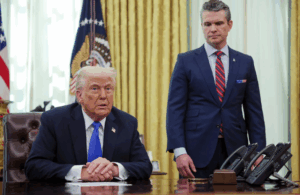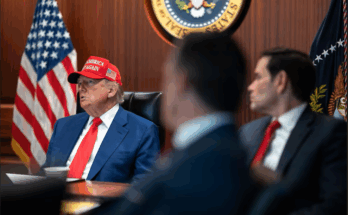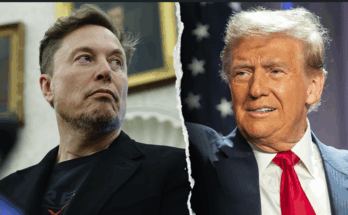Pete Hegseth didn’t become defense secretary because he had the resume of a great statesman.
But President Donald Trump spent huge political capital getting Hegseth confirmed because the Pentagon chief mirrors Trump’s own riotous political identity and instincts. The point of his selection was to show the conventions and traits that normally define top national security officials don’t apply in the president’s tear-it-down second term.
This is why Hegseth seems safe for now despite stunning new revelations that he shared sensitive military plans in a group chat that included his wife and brother, among others, following an earlier scandal over his communicating details about strikes on Yemen in a chat with top officials.

It’s not entirely surprising that the former Fox News anchor isn’t acting like the kind of national security official who guards sensitive information with their life.
“It’s what you get when you don’t really care about qualifications for jobs like that, when you’re not picking people who are experienced, when your major qualification is personal fealty to Donald Trump,” Trump first-term national security adviser John Bolton said Monday on “CNN News Central.” “That’s what he’s got in Hegseth. That’s why he’s sticking with him. But it’s not what you need to do the job.”
Everyone in a Trump Cabinet operates on borrowed time. The phrase “serving at the pleasure of the president” feels particularly apt given the capricious nature of this commander in chief.
And, critically, Hegseth has not yet committed the unpardonable transgression that led to the departure of two Trump first-term defense secretaries – trying to thwart the president. The first, retired Marine Gen. James Mattis, fought a long battle to rein in the president’s “America first” foreign policy instincts. The final straw came when Trump demanded the withdrawal of US troops from Syria. Another former defense secretary, Mark Esper, wrote his resignation letter months before a departure that was made inevitable when he publicly said he’d oppose the use of troops to quell domestic political protests.
Fresh drama around Hegseth is another reminder that 47th president’s orbit doesn’t follow the rules of normal administrations, in which the breach of sensitive information would be a career-ending disgrace.
Those ejected from the chaotic Trump political inner circle, by contrast, usually committed a transgression that offends or contradicts the president himself.
New questions raised about Hegseth’s approach
The latest controversy concerns detailed plans about a military operation against the Houthis in Yemen that were shared on a second Signal group chat. This one was on the former Fox News anchor’s personal phone and included his wife, lawyer and brother, three people familiar with the chat told CNN. The chat was set up during Hegseth’s confirmation hearing process, two of those familiar with the matter said. But Hegseth continued using the chat to communicate after he was confirmed, the sources said.
As a national security matter, Hegseth’s lack of discretion mocks the standards and laws that his civilian and military subordinates must follow. It’s even possible that active-duty US personnel engaged in strikes against the Iran-backed militants in Yemen might have been put at risk.
If Hegseth’s alarmingly cavalier approach – which could leave conversations about military operations sensitive to penetration by hostile intelligence agencies – had caused a military disaster, Trump would have no option but to act. That point has not yet been reached. But if his stewardship of the military as a whole reflects his carelessness so far, alarm will mount about the quality of advice reaching the president.
There will also be questions of morale and the defense secretary’s authority, since lower-level staffers or military personnel would almost certainly face discipline, dismissal or even prosecution for such lax handling of sensitive material.
News of the second Signal chat came as some of Hegseth’s closest former advisers issued warnings about turmoil at the Pentagon. They included his former spokesman John Ullyot and three former senior officials Hegseth fired last week – top adviser Dan Caldwell; deputy chief of staff Darin Selnick; and Colin Carroll, who was chief of staff to the deputy secretary of defense.
“It’s been a month of total chaos at the Pentagon. From leaks of sensitive operational plans to mass firings, the dysfunction is now a major distraction for the president — who deserves better from his senior leadership,” Ullyot said in a statement obtained by CNN. Ullyot also wrote a Politico op-ed.
Signs of disorder at the Pentagon are especially worrying, since they are building at a moment when sober, careful leadership of the world’s most lethal military seems more important than ever.
The administration’s effort – for example – to try to end the war provoked when Russia, the world’s largest nuclear power, invaded Ukraine appear to be reaching a make-or-break point and could cause unpredictable geopolitical consequences. Trump’s team is in the middle of critical nuclear talks with Iran. If they fail, the president will face a fateful choice over whether to launch risky military strikes to thwart the Islamic Republic’s alleged pursuit of a nuclear weapon. And the president’s wild tariff war sharpened an already simmering standoff with China. Even a minor incident between forces in close quarters in tense East Asian waters could trigger a superpower conflict.



